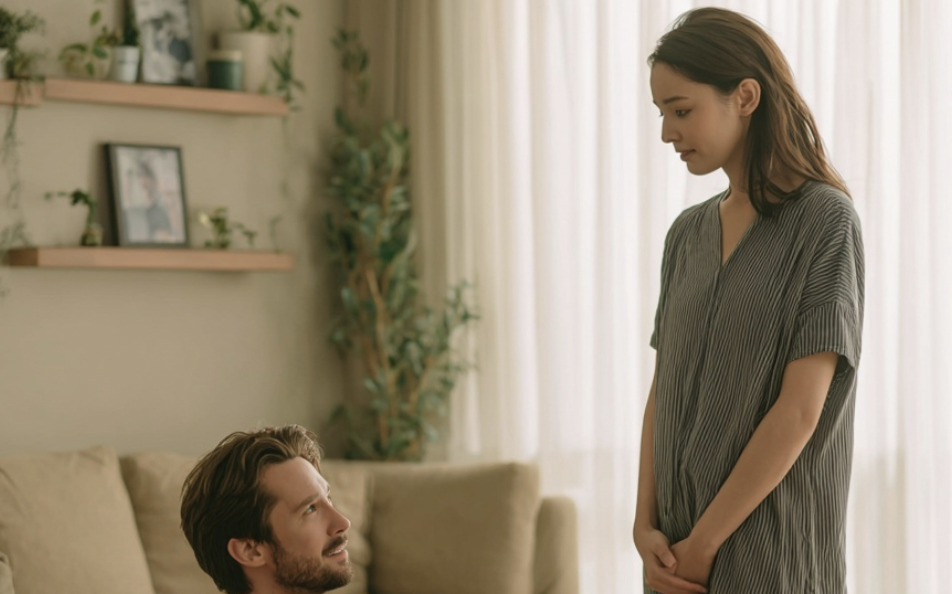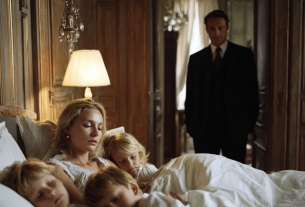Natalya was awakened by the persistent ringing of her mobile phone. It was still dark outside; the alarm clock showed it was just eight minutes into August — Monday morning. Next to her, Vitaly groaned in annoyance and yanked the pillow over his head, trying to muffle the irritating sound.
“Hello?..” Natalya’s voice trembled, groggy and hoarse.
“Natalya, it’s Valentina Ivanovna, your mother’s neighbor,” came the anxious voice of an elderly woman. “Dear, brace yourself… your mother… Her heart gave out last night. We called an ambulance, but… they didn’t make it in time.”
The phone slipped from her fingers. The room spun. Mom… she was gone. Just three weeks ago they had spoken—Yelena Pavlovna had complained about the heat, told her about the apple trees and the garden harvest…
“What happened?” Vitaly muttered, eyes still closed.
“My mom died,” Natalya breathed. The words sounded foreign, like they didn’t belong to her.
Her husband propped himself up on his elbows and gave her a brief glance. No pain, no sympathy—just mild irritation.
“Well, that’s unfortunate. My condolences,” he muttered, then turned back to the wall.
Natalya stood up slowly. Her legs felt like jelly, but she had to act. The funeral, paperwork, packing… Her head spun with thoughts. She opened the closet, pulled out a travel bag, and began packing: a black dress, shoes, her passport.
Vitaly sat up in bed, picked up his phone, and casually opened the news feed.
“Where are you going?” he asked indifferently, eyes still glued to the screen.
“To the village. For the funeral.”
“What village? That godforsaken place 300 kilometers away?”
“Vitaly, my mother died. Don’t you understand?”
He winced like he’d heard something unpleasant.
“Look, I have an important presentation this week. Management’s coming from Moscow. I can’t just drop everything and drag myself out to that hole.”
Natalya froze, holding a shirt in her hands, and turned slowly.
“I’m not asking you to drop everything. But this is my mother’s funeral.”
“So what? The dead don’t care who shows up. I have to think about my career. We have a mortgage, remember?”
She continued packing in silence. After fifteen years of marriage, Natalya had endured his temper, stinginess, and indifference to domestic life. But something inside her broke. The last thread holding them together snapped.
“How long are you staying?” Vitaly asked, heading to the kitchen.
“Three or four days. I need to organize everything, do the paperwork.”
“Just don’t spend too much. We already have enough expenses.”
Natalya clenched her jaw. What expenses was he talking about? His new smartphone that cost 80,000 rubles? His endless fishing trips?
Two hours later, she stood at the bus station with her bag. Vitaly hadn’t even offered to drive her—said he was “going the other way.” No hug, no words of support.
“Let the locals dig the grave,” he’d said in parting. “I’m not dragging myself out to that dump.”
On the bus, Natalya sat by the window. Fields rushed past, golden stubble under the August sun. Her mother had loved this time of year. She used to say August was the most generous month, when the earth gives back for all the labor.
A plump woman with a kind face sitting next to her asked gently:
“Going on vacation?”
“For a funeral. My mother died.”
“God rest her soul… Burying a parent is the hardest thing.”
Natalya nodded. She didn’t feel like talking. Vitaly’s words echoed in her mind: “not dragging myself.” How could someone be so indifferent? Yelena Pavlovna had always treated him kindly—sending homemade preserves, knitting socks, taking care of him when he broke his leg. She looked after him for a whole month.
The village greeted her with quiet and the scent of freshly cut grass. The house at the edge of town—whitewashed, with blue shutters. Her mother refreshed the whitewash every year: “A home should be beautiful, like a holiday.”
Valentina Ivanovna met her at the gate.
“Natalya, my dear… Yelena Pavlovna didn’t complain at all, she was working in the garden, seemed cheerful…”
“Where is she?”
“In the house. We prepared her with the neighbors. In the blue dress—her favorite. The coffin was made by Petrovich, he’s our local craftsman.”
Natalya entered the living room. The coffin rested on a table covered with a white cloth. Her mother lay peacefully, as if asleep. Her face looked smoother, younger. Natalya fell to her knees and wept for the first time that day.
The funeral was set for the next day. Natalya called her relatives—her cousin, her nephew. Everyone promised to come.
That evening, Alexander Petrovich—the head of the village council—came by. Gray-haired, bearded, he knew everyone in the village.
“Natalya Sergeyevna, please accept my deepest condolences. Yelena Pavlovna was a rare soul. Everyone here respected her.”
“Thank you.”
“I’m here on official business. Your mother came to me a year ago—asked to notarize a copy of her savings book. The deposit was in your name.”
Natalya took the document in surprise. Her mother had never mentioned it. She lived modestly, saved on everything.
“It’s a decent amount—about 800,000 rubles,” the chairman continued. “She saved for years, and with interest it added up.”
Natalya’s heart clenched. Eight hundred thousand—it could change their lives. Pay off part of the mortgage, buy a car, renovate the apartment…
“And she left you the house too. The will is with the notary in the district center. She thought of everything, smart woman.”
After Alexander Petrovich left, Natalya sat on the porch. The sky burned with pink hues. Cows mooed in the distance, returning from pasture. Her mother loved these evenings—sitting with a cup of tea, watching the sunset.
Her phone was silent. Vitaly hadn’t called. Not once all day. Natalya dialed him herself.
“Yes?” His voice was irritated.
“The funeral is tomorrow. At two o’clock.”
“So what? I told you—I’m not going.”
“That’s not why I’m calling. Mom left a deposit. In my name. Eight hundred thousand.”
Silence. Then a light cough.
“Eight hundred? Are you serious?”
“Yes. And she left me the house too.”
“That’s… that’s great!” His voice suddenly turned warm. “Listen, maybe I should come after all? Help with the paperwork?”
“No need. I can manage.”
“Natalya, come on. I’m your husband. I should be there for you.”
She smiled bitterly. When she grieved—he turned his back. When he heard “money”—he remembered his duty.
“Come if you want,” she said quietly. “If not—stay where you are.”
Vitaly didn’t come. Only relatives and neighbors attended the funeral. Yelena Pavlovna was laid to rest with dignity—quiet memorial speeches, kind memories, genuine tears from those who knew her as a kind, hardworking woman who devoted her life to her children and her land.
Four days later, Natalya returned to the city. The key barely turned in the lock—Vitaly had again forgotten to oil it. His dirty sneakers were in the hallway, his jacket thrown carelessly on the rack. The living room looked like a storm had passed through—beer cans on the table, pillows on the floor, an ashtray overflowing with cigarette butts. The kitchen was worse: a mountain of dirty dishes, hardened food scraps, the trash bin overflowing. Just four days—and the apartment looked like it belonged to someone who didn’t care.
In the bedroom, Vitaly lay in a wrinkled t-shirt, staring at his tablet. Hearing her steps, he looked up but didn’t get up.
“So, you’re back? I’m hungry.”
Natalya stood in the doorway, looking at him—his unshaven face, greasy hair, a posture more lazy than tired. Fifteen years with this man… How had it come to this?
“Did you even wash the dishes once while I was gone?”
“No time. Work.”
“Today is Sunday.”
“So what? I need rest too.”
She walked into the kitchen in silence and began cleaning. Her hands moved automatically, but her mind was far away. Thinking of her mother, who had saved every ruble for years so her daughter could have a better life. Of the man who couldn’t even take out the trash while his wife buried her mother. Of a life that was supposed to get easier—but had turned into a burden.
That evening, something unexpected happened. Vitaly came home with a huge bouquet of red roses and a bag from the bakery—her favorite eclairs.
“Sweetheart, I’ve been thinking… I behaved terribly. Your mom died, and I didn’t support you, didn’t go… That was so wrong of me.”
He placed the flowers in a vase, neatly arranged the pastries on a plate, brewed tea. His face was tense, like he was forcing remorse.
“Forgive me, Natalya. I should’ve been there. Remember how we met? At that fair, where you were selling cucumbers and zucchini. Your mom smiled at me like I was family.”
Natalya nodded. Yes, she remembered. Back then, Vitaly was different—alive, attentive, caring. Where had that man gone?
“I was thinking,” he continued, “about the money… We need to handle it right. I can take a day off, go with you to the bank, to the notary. There are so many scammers now… I just want to protect you.”
“Thanks, but I can handle it myself.”
“But we’re a family! We should decide together how to invest the money. I know a guy—he’s into investments, he can help.”
“Vitaly, it’s my mother’s inheritance. I’ll make the decisions myself.”
He frowned but quickly composed himself.
“Of course, dear. But you understand—in a family, everything is shared. We’ve been together for years, paying the mortgage together…”
“That you took out in your name,” Natalya reminded him quietly but firmly.
“That’s just a formality! The apartment is ours, you’re registered there…”
“Registration doesn’t mean ownership. And inheritance is not marital property.”
Vitaly stood up abruptly. The mask of the repentant husband slipped.
“What are you saying? That you won’t share?”
“I’m saying I won’t rush into anything. My mother died a week ago. I need time.”
“Time?” His voice sharpened. “When I needed a car, you didn’t ask for time! You just said we had no money!”
“Because we didn’t. We were barely scraping by.”
“But now we do! Eight hundred thousand! We can buy a decent car, go to Europe—not that shabby spa you dragged me to!”
“That ‘shabby spa’ was the only one we could afford. I saved for it for six months.”
“Enough!” Vitaly slammed the table. The vase with roses shook. “I’m your husband! I have a right to half!”
“No, you don’t. The law clearly states: inheritance is separate property.”
“How do you know that?”
“I read it. On the bus. And I also found out I can file for divorce without your consent.”
Vitaly froze. Then slowly sank into a chair.
“You want a divorce?”
“I’m considering it. Vitaly, face the truth. You didn’t come to my mother’s funeral because you didn’t care. And now you suddenly ‘care’—only after hearing about the money.”
“I truly regret it! It’s just… work, stress…”
“Don’t lie. You don’t care that I lost my mother. You care about the bank account.”
“How dare you! I’ve worked for us for fifteen years!”
“Worked? When’s the last time you cooked dinner? Did the laundry? Asked how I was? I work just as much, but I run this house alone!”
“That’s a woman’s job!”
“And a man’s job is what? Being rude, demanding, doing nothing? Where were you when I needed support?”
Vitaly grabbed the vase and hurled it at the wall. The roses scattered, glass shattered on the floor.
“You ungrateful wench! I pulled you out of that village and gave you a decent life!”
“From the village? I graduated from university, got a job, earned my own money! You just showed up later and took credit!”
The argument hit its peak. Vitaly shouted, flailed his arms, spit flying. Natalya looked at him and, for the first time in years, saw—not a husband, but a stranger. Aggressive. Greedy. How had she excused him for so long? Told herself, “He’s just tired,” “He means well,” “He’ll change with time”?
“You know what?” she said quietly, standing up. “Get out.”
“What? This is my apartment!”
“This is a mortgage apartment, and I pay half. But if you want, I’ll call the police. Tell them how you’re breaking things.”
She took his keys off the hook and handed them to him.
“I’ll pack your things and leave them in the hallway. Take them and go.”
“You wouldn’t dare!”
But at that moment, the door across the hall opened. Nina Vasilievna, the neighbor, stepped out, drawn by the noise.
“Everything’s fine, Nina Vasilievna,” Natalya said calmly. “Vitaly was just leaving.”
The woman glanced at his distorted face, then at Natalya—tired but resolute. She nodded.
“If you need anything—call me. Petrovich will help.”
Vitaly realized he had lost. With a witness present, he didn’t dare cause more trouble. He grabbed his jacket and stormed out.
“You’ll regret this!” came his shout from the stairwell.
Natalya shut the door and leaned against it. Her hands were trembling. But inside—there was no emptiness, no fear, only a strange, unexpected relief. As if after years of captivity, she was suddenly free.
The next day, she packed his things into boxes, left them in the hallway, changed the locks, and notified the concierge.
A week later, she filed for divorce. No children, no property disputes. In court, Vitaly tried to claim half the deposit, but the judge clearly explained: inheritance is personal property.
A month later, everything was finalized. The 800,000 rubles were in her account. The house in the village was officially hers. Natalya took a vacation and went there—to sort through her mother’s belongings, clean up, breathe the air of her childhood home.
Standing on the porch, she watched the sunset. The warm wind smelled of apples and hay. Somewhere in the distance, children laughed, cows mooed. Peace. For the first time in years—true peace.
Her phone rang. Vitaly’s number. Natalya calmly declined the call and blocked the contact.
The past was behind her. Ahead lay a new life. Without humiliation. Without pretending. Without having to endure a stranger beside her.
Her mother had been right: happiness isn’t about money. Happiness is having the right to choose how to live.
And now, Natalya had that choice.



